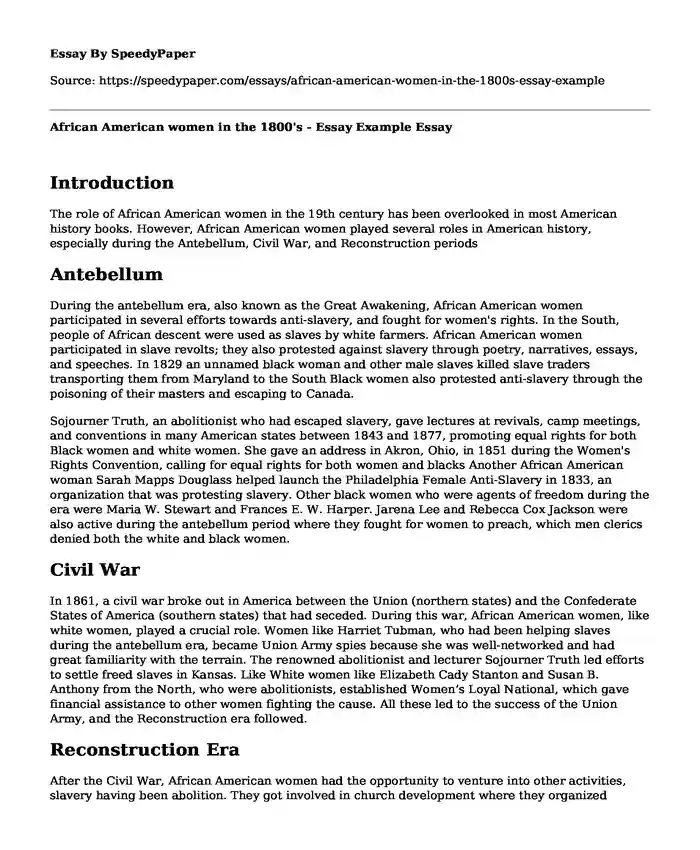Introduction
The role of African American women in the 19th century has been overlooked in most American history books. However, African American women played several roles in American history, especially during the Antebellum, Civil War, and Reconstruction periods
Antebellum
During the antebellum era, also known as the Great Awakening, African American women participated in several efforts towards anti-slavery, and fought for women's rights. In the South, people of African descent were used as slaves by white farmers. African American women participated in slave revolts; they also protested against slavery through poetry, narratives, essays, and speeches. In 1829 an unnamed black woman and other male slaves killed slave traders transporting them from Maryland to the South Black women also protested anti-slavery through the poisoning of their masters and escaping to Canada.
Sojourner Truth, an abolitionist who had escaped slavery, gave lectures at revivals, camp meetings, and conventions in many American states between 1843 and 1877, promoting equal rights for both Black women and white women. She gave an address in Akron, Ohio, in 1851 during the Women's Rights Convention, calling for equal rights for both women and blacks Another African American woman Sarah Mapps Douglass helped launch the Philadelphia Female Anti-Slavery in 1833, an organization that was protesting slavery. Other black women who were agents of freedom during the era were Maria W. Stewart and Frances E. W. Harper. Jarena Lee and Rebecca Cox Jackson were also active during the antebellum period where they fought for women to preach, which men clerics denied both the white and black women.
Civil War
In 1861, a civil war broke out in America between the Union (northern states) and the Confederate States of America (southern states) that had seceded. During this war, African American women, like white women, played a crucial role. Women like Harriet Tubman, who had been helping slaves during the antebellum era, became Union Army spies because she was well-networked and had great familiarity with the terrain. The renowned abolitionist and lecturer Sojourner Truth led efforts to settle freed slaves in Kansas. Like White women like Elizabeth Cady Stanton and Susan B. Anthony from the North, who were abolitionists, established Women’s Loyal National, which gave financial assistance to other women fighting the cause. All these led to the success of the Union Army, and the Reconstruction era followed.
Reconstruction Era
After the Civil War, African American women had the opportunity to venture into other activities, slavery having been abolition. They got involved in church development where they organized missionary societies, volunteered to travel abroad to empower fellow women, and raised finances to support volunteers. They also sought rights to be preachers in their Baptist and Methodist churches, which received strong opposition from male clerics African American women also got involved in politics by establishing Civic Improvement Leagues, fighting for abolishing child labor, engaging in prohibition, fighting for women's educational rights, took part in political activism, and women's suffrage Although African American women, unlike white women, were not allowed to vote, they participated in voting by giving opinions to their husbands who were allowed to vote.
References
Brinkley, Alan. The Unfinished Nation: A Concise History of the American People, Volume II. Vol. 12. McGraw-Hill, 1993.
Grayson, Sandra M. "Black Women in Antebellum America: Active Agents in the Fight for Freedom." (1996).
McDevitt, Theresa. "African American women and espionage in the Civil War." Social Education 67, no. 5 (2003): 254-260.
Scott, Anne Firor. The southern lady: From pedestal to politics, 1830-1930. Chicago: University of Chicago Press, 1970.
Tatum, Noreen Dunn. "A Crown of Service: A story of women's work in the Methodist Episcopal Church, South, from 1878-1940." (1960)
Cite this page
African American women in the 1800's - Essay Example. (2024, Jan 04). Retrieved from https://speedypaper.com/essays/african-american-women-in-the-1800s-essay-example
Request Removal
If you are the original author of this essay and no longer wish to have it published on the SpeedyPaper website, please click below to request its removal:
- Meaningful Relationship Essay Sample
- Human Resource Management Essay Example
- Personal Essay Example: A Trip to Forget
- Jaqueline - Personal Essay Example
- Paper Example. Runway Overrun of a Canadair Regional Jet
- Paper Example - Critical Thinking Assessment Tool
- Paper Example. Reliability and Validity of Research Methodology
Popular categories





